Feature
It's a Wrap! Independent Publisher Book Awards Rock the Big Apple
IPPY Awards Entrants Examine World Issues
Congratulations and sincere thanks to the over 1,500 independent authors and publishers who participated in the 2007 Independent Publisher Book Awards. This year, a total of 3.378 entries were submitted from all 50 U.S. states and the District of Columbia, eight Canadian provinces, and 18 countries overseas.What really struck us about this year's entries was the passion and commitment of the authors for their topics. So many of these books deal with serious issues facing citizens of the world today: the threat of war, terrorism, health epidemics, climate change, and the loss of human rights.
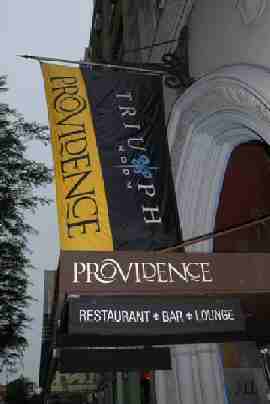
Our fiction winners wrote about everything from the Sudanese civil war and the Holocaust, to school shootings and abortion rights. Our Health and Psychology winners offer new and valuable information on dozens of diseases and disorders. Poetry finalist The Other Side of Sorrow: Poets, Speak Out About Conflict, War, and Peace, does what poets do, speak out. Ah, the poets...the conscience of our society.
Judging by this year's entries, independent publishers are becoming more and more concerned about the state of our world, raising questions, researching obscure and little-known issues, and often providing solutions to difficult problems facing us all. It's an honor to be involved with this vibrant publishing community, and a privilege to read and evaluate these incredible books. It is the mission of “IPPY” to bring attention to these deserving books and the wisdom and information they offer.

Some of these award-winning books will be of value to the entrants themselves. Our new Writing/Publishing category attracted great volumes of advice, including this year's Silver medalist William F. Nolan shares the secrets of “writing fiction that sells.” (His novel Logan’s Run was published in 1968 and is still selling today). In The Well-Fed Self-Publisher, author Peter Bowerman explains how to turn one book into a full-time living. Mark Levine analyzes the contracts and services of 47 Print On Demand publishers in The Fine Print of Self-Publishing. Mystery writers will want to check out our Reference category silver medalist, the fascinating Body Trauma: A Writer’s Guide to Wounds and Injuries, from Behler Publications.
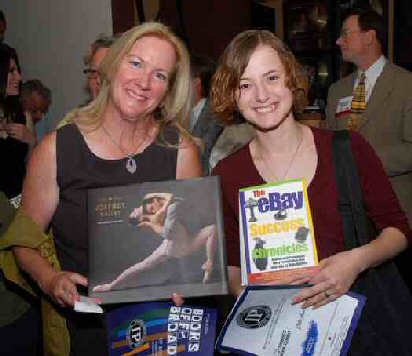
The Writing/Publishing Gold medal winner, publishing midwife" Sal Glynn, admits that “your book's cover is its best selling point,” and must pass the "ten-foot test." Says Glynn: "The title should be readable from ten feet away, a bright lighthouse lamp beaming from the shelves." Glynn also stresses the need for an author to be a savvy and incessant marketer: "Since you're a published writer with a book in the marketplace, start your morning by asking what you can do to promote your work. Are there bookstores to contact for readings, listservs waiting for a notice, or flyers ready for mailing? Keep the thank-you notes going out and be nice to everyone you meet."
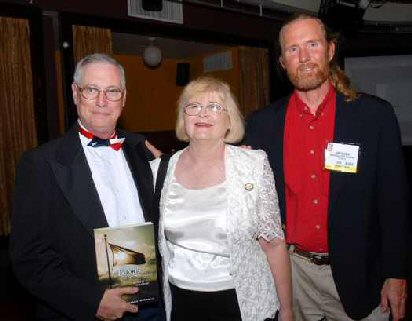
It's not because they were nice to us, but because their books continue to amaze us, that we had some repeat winners this year. Two years ago, one of our judges commented about the 2005 History category winner, The Old Chicago Neighborhood: Remembering Life in the 1940s, that it “makes Chicago history come to life, and that’s what a history book is supposed to do." Well, this year Neal Samors followed up with Chicago in the Sixties and won again, because of the way the book brings 1960's Chicago to life. Couple this book with Great Lakes Best Regional Non-Fiction winner Richard Nickel's Chicago: Photographs of a Lost City, and you've got an entertaining and exhaustive study of those turbulent times in the Windy City.
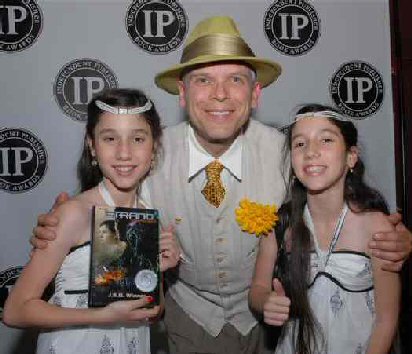
Columnist Patty Fedeli captured the Humor gold medal for the second year in a row with More Vintage Whine. An excerpt:
“Competition between children is now frowned upon. Winning and losing have become endangered concepts as no one keeps score at T-ball and soccer games. Brownies and Girl Guides no longer have to excel at a particular skill to earn merits. Instead of practicing knot-tying or campfire-making, the girls are awarded badges for massage and aromatherapy. If this practice catches on, soon the Olympics will be a year-long event wherein everyone will receive a medal. The quickest way to fortune will be to open a trophy shop.”
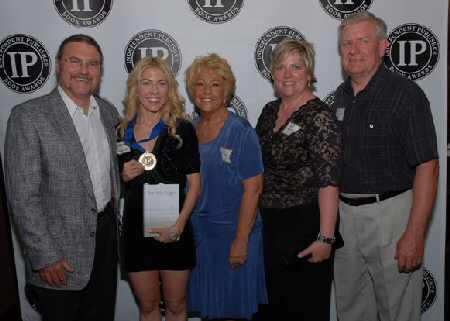
We can’t give everyone an IPPY Award, but we do give congratulations and encouragement to all entrants for their daring commitment to writing and publishing books in a challenging and competitive marketplace. Reading is fundamental – and vital to our survival as a species. Keep on writing and publishing. Long live independently published books!
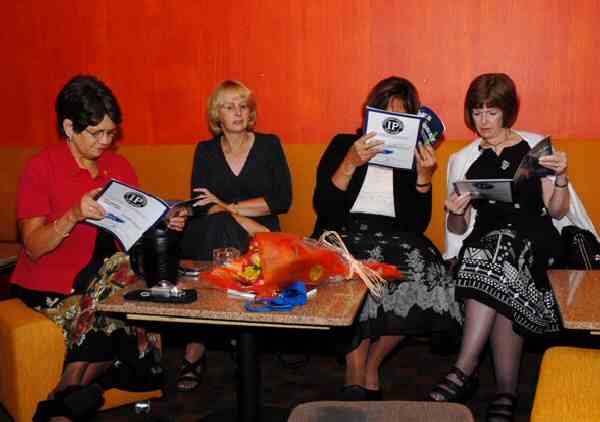
Those who attended the IPPY Awards event in New York showed their independence and toughness by first putting up with a hot muggy day in the city, and then an over-crowded, noisy room for the presentation. It was chaotic but fun, I hope, and I wish I'd been able to spend more time with all of you, more than the quick photo we had to settle for. I truly appreciate your efforts to be there, and your graciousness in accepting the frustrating circumstances. If only we could give each book and every person involved the recognition they deserve - we could have been there all night!

Here are the two poems I read to start the ceremony, the first one sent for the occasion by bronze medal-winning poet Victor di Suvero:
We Are Here
Yes, we are all here, having come from so many
Different places, from across town or across oceans
Traveling our different roads to be together, here.
Our parents and their parents too all had to stretch
To bring us from those elsewheres to this one place
Filled with dreams, hopes and laughters or even
Pain and troubles, but made it all happen so
That we are here together now.
Even the child,
Newborn, was in its mother's womb before it drew
Its first breath, coming here from another place.
Even those of us who came here because of wars,
Fought as always for land, for oil or even peace
Know that we are all joined in this one great
Adventure we call being alive.
We wake at dawn, pleased we have been given
Another day to work, to play, to read, to shout
Or dance, sing and even pray since tomorrow is
Still not promised to any one of us.
It should speak well for all of us if violence could
Be diminished and the ways of being together
With each other are enhanced.
Yes, do turn now
And turn again to each other with a smile or hug
To share this blessing that we are in fact alive
And well and here together
No matter where we came from or when.
I then read another poem by Mattie Stepanek, the young poet who was named our Peacemaker of the Year, for the book Just Peace: A Message of Hope, written with Jimmy Carter and published after after Mattie's death in 2004. I thought it appropriate to read this poem in New York, five years after the publishing world met here for the first BookExpo after 9/11. Mattie wrote this poem the night of 9/11/2001:
FOR OUR WORLD
We need to stop.
Just stop.
Stop for a moment.
Before anybody
Says or does anything
That may hurt anyone else.
We need to be silent.
Just silent.
Silent for a moment.
Before we forever lose
The blessing of songs
That grow in our hearts.
We need to notice.
Just notice.
Notice for a moment.
Before the future slips away
Into ashes and dust of humility.
Stop, be silent, and notice.
In so many ways, we are the same.
Our differences are unique treasures.
We have, we are, a mosaic of gifts
To nurture, to offer, to accept.
We need to be.
Just be.
Be for a moment.
Kind and gentle, innocent and trusting,
Like children and lambs,
Never judging or vengeful
Like the judging and vengeful.
And now, let us pray,
Differently, yet together,
Before there is no earth, no life,
No chance for peace.
Yes, the poets – and independent publishers in general -- are the conscience of our culture. It is the courage of outspoken authors and visionary artists that the IPPYs are designed to recognize.
I’ll let a poet have the last word, with an excerpt from this year's Anthology category winner, Reading Writers Reading: Canadian Authors’ Reflections. Ottawa poet and novelist Colin Morton writes:
"Our new century is beginning as bloodily as the last on did, but also hopefully. Despite the horrors we have witnessed, people still believe that talking and writing bring the hope of understanding that is a necessary condition for peace."

